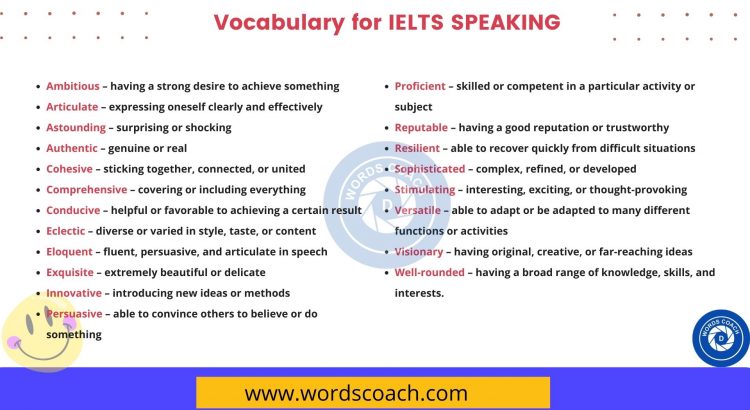Vocabulary for IELTS SPEAKING
To excel in the IELTS Speaking test, having a strong vocabulary is essential. The right vocabulary can help you express your ideas more clearly and effectively. In this context, in this article, we will discuss some essential vocabulary words that could be used to boost your IELTS Speaking score.
Here are some vocabulary words that are commonly used in the IELTS Speaking test, along with their meanings:
- Ambitious – having a strong desire to achieve something
- Articulate – expressing oneself clearly and effectively
- Astounding – surprising or shocking
- Authentic – genuine or real
- Cohesive – sticking together, connected, or united
- Comprehensive – covering or including everything
- Conducive – helpful or favorable to achieving a certain result
- Eclectic – diverse or varied in style, taste, or content
- Eloquent – fluent, persuasive, and articulate in speech
- Exquisite – extremely beautiful or delicate
- Innovative – introducing new ideas or methods
- Persuasive – able to convince others to believe or do something
- Proficient – skilled or competent in a particular activity or subject
- Reputable – having a good reputation or trustworthy
- Resilient – able to recover quickly from difficult situations
- Sophisticated – complex, refined, or developed
- Stimulating – interesting, exciting, or thought-provoking
- Versatile – able to adapt or be adapted to many different functions or activities
- Visionary – having original, creative, or far-reaching ideas
- Well-rounded – having a broad range of knowledge, skills, and interests.
Building a robust vocabulary is crucial for achieving a good score in the IELTS Speaking test. It not only helps you convey your message effectively but also reflects your command over the English language. By using the words discussed in this article and practicing them regularly, you can enhance your vocabulary and ace the IELTS Speaking test.

